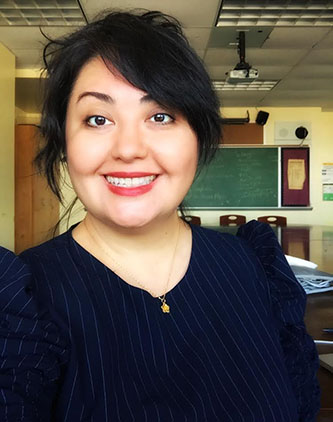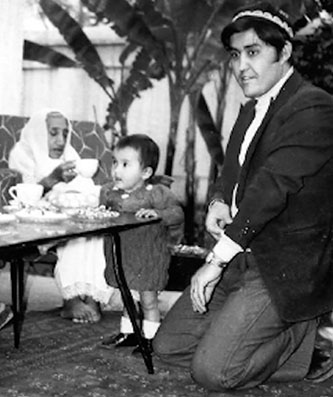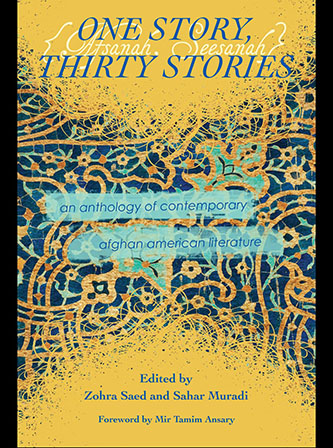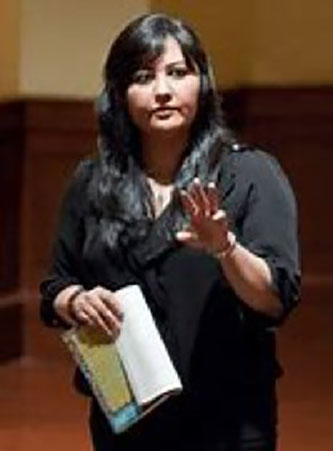Alumni Profile: Zohra Saed

Zohra Saed '99
Zohra Saed is an Afghan-American writer who earned an M.F.A in poetry from the Brooklyn College Department of English and currently teaches a justice and equity seminar at Macaulay Honors College as an adjunct, though her specialty is Central Asian film and literature, an area she will be revisiting later in her career. Her literary work reflects her identity as a member of Afghanistan's minority Uzbek Turkic-speaking ethnic group. Coming from a marginalized community in Afghanistan, she well understands the place of America's long marginalized communities of color. She is also a social activist who, since the American withdrawal from Afghanistan, has been organizing efforts to rescue Afghan intellectuals and their families from the fears and uncertainties they face under Taliban rule.
Writing started for Zohra when she first immigrated to America as a non-English-speaking child. From the early process of learning English, she fell into the habit of reading a lot and then decided that she, too, had stories to tell. Zohra expressed how her father told her old traditional folk stories when she was little and how she felt as though those stories needed to be shared, just like the books she read at her school library. That one moment of realization led to Zohra writing her own little stories on the back of library cards, as a means to get her own writing on a shelf for others to discover. Zohra notes that "my first public writing is as a vandal in the second or third grade." Although it was an unconventional start to her writing career, she has since blossomed into a wonderful author with multiple publications on her résumé.

Zohra Saed as a toddler with her father and grandmother in Jalalabad.
Zohra helps manage Upset Press, where she and her colleague Rob Boris publish and circulate writing pieces that would not otherwise have a public life. Upset Press was established in 2000 and the team published their first book in 2005. Since then, it has added several books to its compendium of published work. Zohra explained that Upset Press first started with her and Rob making zines but then snowballed into collaborative efforts with other creative writers producing dozens of wonderfully diverse books. She also noted that Upset Press focuses on publishing works that are experimental and not necessarily "commercial." Zohra has created a real sense of community within Upset Press, with a group of friends who are all like-minded and committed to upsetting the status quo. Their approach results in work that reflect real-life issues and unconventional topics. Zohra went on to say, “We don’t just publish books. We're all friends. I like that sense of building a library shelf of people we admire, people we love, and really making it a labor of love. I definitely am proud of that community that I am part of.” Upset Press publishes work that is set in controversial places and features narratives that are not normally seen in the mainstream world of publishing. Zohra stresses the importance of publishing work that is "based on the beauty of the words." The overall message of the publications is to stay true to the words and make sure all voices are heard regardless of the commercial sway of the literary world.
One of the recent and intensely impactful initiatives of Zohra and her team at Upset Press has been helping with the evacuation of an Afghan writer, an Afghan teacher, and a family of 12 Afghans from the danger and displacement they are facing in Afghanistan under Taliban control. In one of Zohra’s recent articles, "Afghan, Afghan American, Afghan Again and Again," she writes, "We need to understand this together. Whether we know each other or not, we are Afghan. Even if our links are strained, even if our language is threadbare, choppy, we feel connected to each other. This comforts us and we need each other to talk through this. To ask together, what will happen to our families, friends, and to the people in Afghanistan?"
The root of this evacuation project runs deep with Zohra's connection to her country and her ancestry, and Upset Press has been diligently working remotely, trying to gather resources in order to allow this Afghan literary family to have a chance at a free life. They have started a Go Fund Me effort and have reached out to politicians who have said that they wanted to help with the evacuation of the Afghan people. This project greatly relies on Zohra’s sense of community and connection, and by helping out she is bridging the virtual gap and creating hope and community from thousands of miles away.

One Story, Thirty Stories, an anthology edited by Zohra Saed and Sahar Muradi.
Zohra's major literary project is revamping her thesis on Harlem Renaissance poet Langston Hughes, a work of translation entitled Langston Hughes: Poems, Photos, and Notebooks From Turkestan, which she plans to publish in January 2022. She notes that it has taken her a while to finish the project, as she has had to navigate the various Turkic languages and dialects, since some of them overlap and differ when they are put down as words on a page. Zohra explains her love for Hughes by saying that she wants to “show Hughes as someone who builds community where he goes.” She said she was really fascinated by the sense of community expressed in Hughes’ work and whom she sees as someone who values and finds strength in community. Zohra says that this project allows her "to connect New York to Central Asia and connect the African American experience to the Turkic experience in Central Asia during the time period (the 1930s and 1940s)." She went on to say, "For me it's important to restore that history, write about it, and also write about that sense of community." This impetus drives her writing and demonstrates her thirst for creating change and transformation through her writing.

Zohra Saed teaching as an adjunct.
This ongoing engagement with community tracks back not only to her writing but her teaching as well. She first started teaching Central Asian film and literature at Hunter College, where she was excited to share the Central Asian experience through film, a genre that can be overlooked in general film history courses. Zohra approaches the classroom with a sense of hospitality, much like the one she grew up with, so that students feel comfortable to express themselves and feel accepted within their own little classroom community. Some advice that Zohra likes to share with her classes is "the importance of their own voices and whatever they read...the importance of perspective, making room and space for conversation with people in spaces you normally wouldn't have, being brave and honest in your conversations and being open to change." This preparation surely creates a welcoming environment that allows learning to flow freely from teacher to student as well as student to teacher.
Zohra's work centers on celebrating Turkic communities and writing about the narrative of transformation and community that is seen throughout history. She is then able to translate works that cultivate the various experiences of Turkic people so they can be enjoyed and consumed by everyone. The never-ending motif of community seems to play a pivotal role in Zohra’s world, bleeding into all aspects of her life and career. Her activism and her methods for giving voice to those who have been silenced are at the core of her philosophy of creating community through literature.






